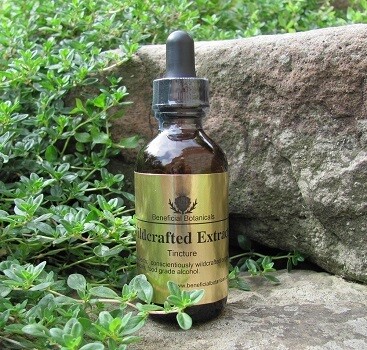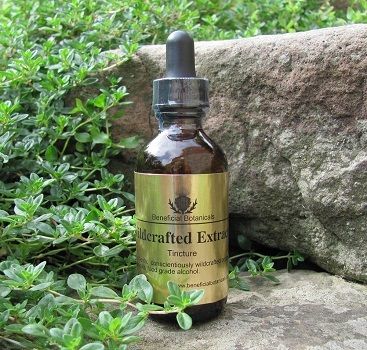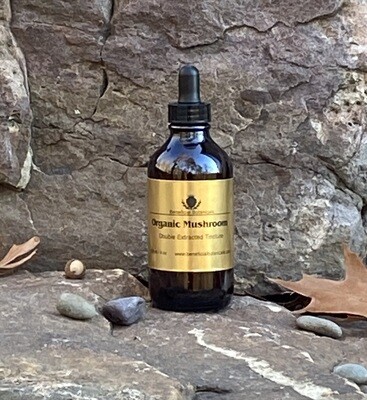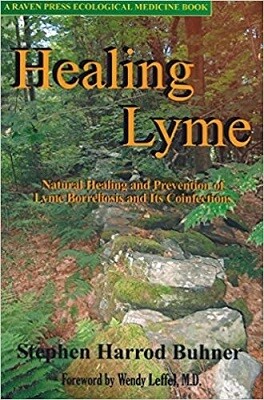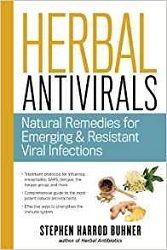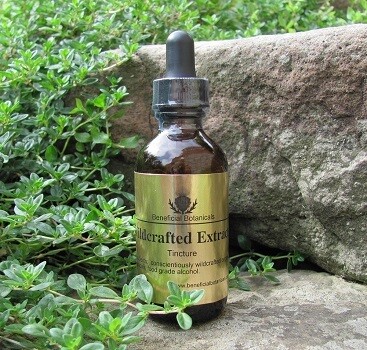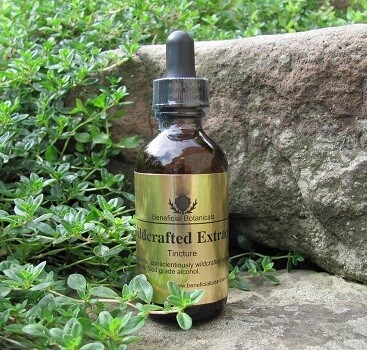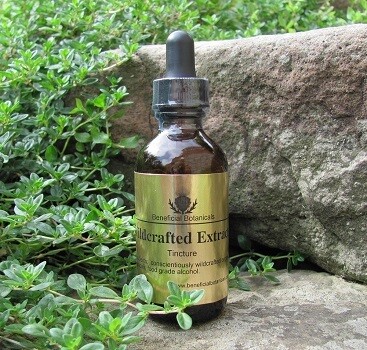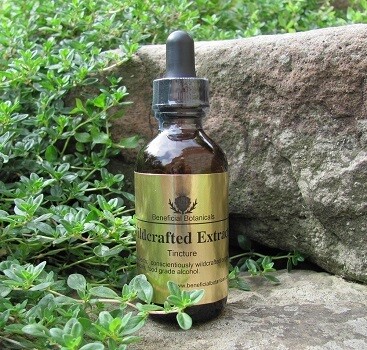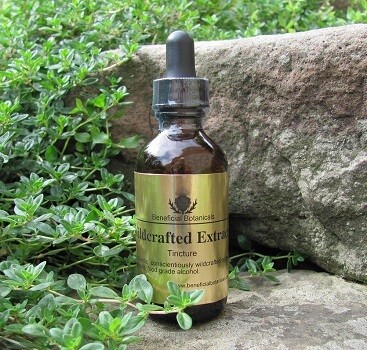Japanese Knotweed Tincture
Label: Beneficial Botanicals
Botanical Name: Polygonum cuspidatum (syn. Fallopia japonica)
Parts Used: fresh roots
Organic: Yes Origin: USA
Menstruum: food grade alcohol
Alcohol by Volume: 32%
Tincture Ratio: 1:2
A good source for high concentration of resveratrol, JKW is known as an essential medicinal for Lyme Disease.
[tab name="Overview"]
Antiviral / Antimicrobial / Antiviral / Antioxidant / Diuretic / Anti-inflammatory / Antitussive / Emmenagogue / Febrifuge
Harvesting Note: Some states have listed Japanese Knotweed as an invasive plant and spray regularly to try to eradicate it. For this reason, we rely on finding plants that have not been sprayed, thriving in pristine locations, away from human activity. Since the roots must be harvested, and there is an increased demand for this plant in the treatment of Lyme Disease, we strive to harvest consciously to obtain this valuable resource from non-toxic locations.
Constituents - Chemicals and Nutrients: resveratrol*, trans-resveratrol, emodin, emodin monomethyl ether, polydatin (piceid), piceatannol**, physcion, astringin, oxalic acid, alkaloids, phenolics, sterol/terpenes, barium, bromine, calcium, catechin, chrysophanol, citreosein, copper, dimethylhyroxychromone, fallacinol, glucofragulin, glucoside, iodine, iron, isoquercitrin, manganese, methylcourmarin, molybdenum, napthoquinone, nickel, phosphorus, physide, piceid, plastoquinone, polydatoside, polygonin, potassium, protocatechuic acid, quercitrin, questin, questinol, reynoutriin, rheic acid, rubidium, rutin, sulfur, tannin, and zinc.
*Resveratrol has been identified as a potent flavonoid in high concentrations in the root of Japanese Knotweed. The plant contains compounds that are part of a group of organic chemicals called stilbenes, which are polyphenolic compounds attached by an ethylene.[1] The root of Japanese Knotweed is richer in resveratrol than any other known plant and now it is the primary natural source of resveratrol and is considered to have a number of beneficial effects, including anticancer, antiatherogenic, antioxidative, anti-inflammatory, anti-microbial and estrogenic activity. [2]
**Piceatannol is a metabolite (necessary for metabolism) of resveratrol. It is known to inhibit JAK-1, a key member of the STAT pathway that is crucial in controlling cellular activities in response to extracellular cytokines, and is a COX-2 inductible enzyme involved in inflammation and carcinogenesis. It is known to suppress a wide variety of tumor cells, including leukemia, lymphoma, and cancers of the breasts, prostate, colon and melanoma. [2][3]
[tab name="Use / Dosage"]
Antioxidant : Daily consumption of 1/2 teaspoon of the tincture, first thing in the morning, provides approx 500 mg of resveratrol which may prevent aging by protecting cellular DNA from free-radical damage.
Antimicrobial : To inhibit the growth of staph, strep, E. coli, and salmonella the dosage is 1/2 tsp. of the tinctured root first thing in the morning, mid-day and at bedtime.
Antiviral : To inhibit the growth of influenza type A, ECHO virus, and herpes simplex, the dosage is 1/2 tsp. of the tinctured root first thing in the morning, mid-day and at bedtime.
Cardiovascular : Due to the high content of resveratrol in Japanese Knotweed root, the plant offers benefits for treating cardiovascular disease. Resveratrol decreases the viscosity of the blood and acts as anticoagulant to thin blood, effective in treating cardiovascular disease by reducing thrombosis and embolisms that can block arteries and lead to myocardial and cerebral infarctions.[4] To use Japanese Knotweed Root tincture for cardiovascular disease, you will need to work with a healthcare professional to determine a dosage relevant to your treatment plan.
Cancer : Numerous studies have reported the multiple anti-cancer effects of resveratrol, protecting against both tumor initiation and cancer progression pathways. Japanese Knotweed root has been used as an anti-cancer agent due to its high concentration of resveratrol and corresponding metabolite, piceatannol. Resveratrol in Japanese Knotweed inhibits cancer cells without harming the liver. Studies indicate the most beneficial use to be in pancreatic, breast, and ovarian cancers. To use Japanese Knotweed Root tincture for cancer treatment, you will need to work with a healthcare professional to determine a dosage relevant to your treatment plan.
Weight Reduction : To date, resveratrol is the most potent natural polyphenolic compound able to enhance lipid oxidation for fat burning.[5] There are no dosage suggestions available for weight loss planning.
Lyme Disease : Japanese Knotweed root is known to aid the central nervous system and kill Lyme bacteria. There is much to know about treating Lyme Disease and how this plant root works within the body. Beneficial Botanicals provides this SUPPLEMENTAL PAGE for further information on the role of Japanese Knotweed root to help you understand cytokine cascades and the likely interactions between the coinfections.
The dosages listed here for the Japanese Knotweed Root Tincture are the maximum and minimum dosages outlined by Stephen Harrod Buhner, author of several books on Lyme Disease. Length of dosage varies from 8 to 12 months.
Maximum Dosage (for Adults & Children)
150 lb adult: 1 teaspoon 3x daily
100 lb adult: 2/3 teaspoon 3x daily
60 lb child: 1/3 teaspoon 3x daily
30 lb child: 1/5 teaspoon 3x daily
Minimum Dosage (for Adults)
150 lb adult: 1/2 to 3/4 teaspoon 2x daily
Neurological : Resveratrol can protect cells from dopaminergic conditions such as Parkinson's Disease. It activates SIRT1 which also treats Alzheimer's Disease. Generally, resveratrol may assist in strokes. Polydatin is known to help treat cerebral injuries. Dosage recommendations are not available. It is necessary to work with your healthcare provider to determine an appropriate dosage based on your physical condition.
Phytoestrogen Hormone : Trans resveratrol found in Japanese Knotweed Root is a phytoestrogen having estrogenic properties, which allows them to mildly mimic and sometimes act as antagonists of estrogen.[6][7] This attribute is useful when a woman's body is lacking in estrogen to avoid bone loss. Before supplementing, test for hormone levels by saliva testing which will show results of all bio-available estrogen in the body, not just in the blood.
[tab name="Precautions"]
Japanese Knotweed Root may interact with several medications, such as blood thinners and drugs metabolized by the P-450 enzyme system in the liver. Consult your healthcare provider before adding to your regiment of drug treatment.
When taking capsules of dried powder root, the presence of emodin, a purgative, may irritate the intestine and cause rapid bowel movements.
Japanese Knotweed tincture is not suggested for use in pregnant or lactating women, or in people with estrogen-sensitive cancers. Trans resveratrol found in Japanese Knotweed Root is a phytoestrogen having estrogenic properties, which allows them to mildly mimic and sometimes act as antagonists of estrogen. Before supplementing, test for hormone levels by saliva testing which will show results of all bio-available estrogen in the body, not just in the blood.
[tab name="References"]
[1] B. Vestano., Y. Chen, N. Zhu, C. Ho, Z. Zhous, & R. Rosen 2000. Isolation and identification of stilbenes in two varieties of Polygonum cuspidatum. J Agric. Food Chem. 48;253-256.
[2] H Piotrowska M. Kucinska, & M. Murias. 2012. Biological activity of piceatannol: leaving the shadow of resveratrol.
[3] H. Piotowska et al. 2012. Mutation Research vol. 750 (2012) 60-82.
[4] Z. Wang, Y. Huang, J. Zou, K. Cao, Y. Xu, & J.M. Wu 2002. Effects of red wine and wine polyphenol resveratrol on platelet aggregation in vivo and in vitro. International Journal of Molecular Medicine 9: 77-79.
[5] S. Wang et al. 2015. Resveratrol induces brown-like adipocyte formation in white fat through activation of AMP-activated protein kinase. International Journal of Obesity 2015; 39: 967-976.
[6] Patisaul, H. B., & Jefferson, W. (2010). The pros and cons of phytoestrogens. Frontiers in Neuroendocrinology, 31(4), 400–419.
[7] Hughes, C. L. (1988). Phytochemical mimicry of reproductive hormones and modulation of herbivore fertility by phytoestrogens. Environmental Health Perspectives, 78, 171–174.[endtab]
These statements have not been evaluated by the Food and Drug Administration. The information provided here is intended to supplement, not substitute for, the expertise and judgement of your physician, pharmacist or other healthcare provider and should not be construed to indicate that the use of this herbal product is safe, appropriate, or effective for you. Consult your healthcare provider before taking this herbal product.

